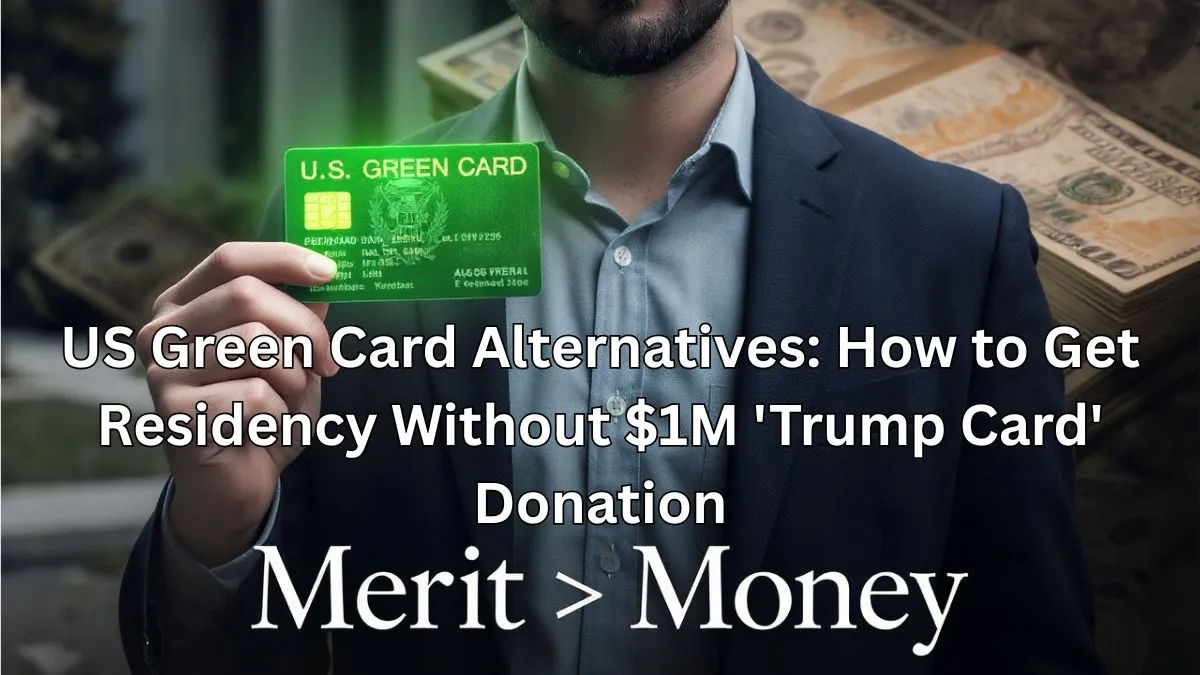The recent announcement of the $1 million Trump Gold Card has set a high bar for wealthy immigrants seeking U.S. residency. However, for skilled professionals, entrepreneurs, and those with significant career achievements, several established and more affordable pathways to a Green Card remain fully viable.
While the administration has positioned the Gold Card as an expedited route for those with deep pockets, many traditional employment-based visas offer permanent residency based on merit, skills, and business investment—not just a massive donation.
The Alternatives: Merit-Based Green Card Pathways
The Trump Gold Card is structured as a non-refundable $1 million gift (or $2 million via corporate sponsorship) that is treated as evidence of “exceptional ability” to qualify the applicant for the EB-1 or EB-2 visa categories.
The good news is that applicants can still qualify for these same categories by proving their professional and national value through traditional, non-donation means:
1. The ‘Genius Visa’ (EB-1A: Extraordinary Ability)
This pathway is for individuals who have reached the very top of their field, whether in the sciences, arts, education, business, or athletics.
- The Requirement: Applicants must demonstrate “extraordinary ability” through sustained national or international acclaim. This typically requires providing extensive documentation, such as proof of a major internationally recognized award (like a Nobel or Olympic Medal) or meeting at least three of ten established criteria.
- The Cost: Primarily the legal fees and government processing fees, which are a fraction of the Gold Card’s financial requirement.
- The Benefit: It offers an immediate path to a Green Card without needing an employer sponsor or a labor certification.
2. The ‘National Interest’ Visa (EB-2 National Interest Waiver – NIW)
The NIW is a powerful option for professionals with advanced degrees or exceptional ability who can prove their work in the U.S. will be in the national interest.
- The Requirement: The applicant must show they have a plan to significantly benefit the U.S. in an area of national importance (like renewable energy, public health, or critical technology) and that their unique expertise makes the need for a labor certification waiver justified.
- The Cost: Similar to the EB-1A, the major costs are administrative and legal, not an upfront multi-million dollar donation.
- The Benefit: It allows professionals to “self-petition”—meaning they do not need a U.S. employer to sponsor them, offering tremendous flexibility.
3. The Traditional Investor Route (EB-5 Immigrant Investor Program)
Although the Gold Card has been presented as a competitor, the original EB-5 visa still exists and may require a lower financial outlay while simultaneously creating U.S. jobs.
- The Requirement: An applicant must invest capital in a new commercial enterprise that creates or preserves at least 10 full-time jobs for qualified U.S. workers.
- The Investment: The minimum required investment is currently $1.05 million or a reduced amount of $800,000 if the investment is made in a Targeted Employment Area (TEA), such as a rural area or an area with high unemployment.
- The Distinction: Crucially, the EB-5 is an investment that must be “at risk” in a job-creating venture, whereas the Gold Card is a non-refundable gift directly to the U.S. Treasury, with no job creation mandate.
4. For the Entrepreneur (E-2 Treaty Investor Visa)
For individuals who wish to run their own business in the U.S. but do not require permanent residency immediately, the E-2 visa is a compelling option with a relatively low barrier to entry.
- The Requirement: The applicant must be a national of a treaty country and make a “substantial investment” in a U.S. business, which they must actively direct and develop.
- The Investment: While there is no statutory minimum, a successful E-2 investment generally requires capital in the range of $100,000 to $200,000, with the funds fully and actively committed to the business.
- The Catch: The E-2 is a non-immigrant visa, meaning it does not directly lead to a Green Card, but it can be renewed indefinitely, allowing for long-term residency and operation of a business.
Conclusion
While the Trump Gold Card offers a fast-track for the ultra-wealthy, it is not the only ticket to the American dream. The U.S. immigration system continues to offer robust, merit-based pathways like the EB-1A and EB-2 NIW, which prioritize professional achievement and contribution over financial donation. For a successful professional or dedicated entrepreneur, these traditional routes remain a powerful and significantly more cost-effective avenue to long-term residency.
Affiliate Disclosure
This article provides information about U.S. government visa programs and is not affiliated with any specific visa program or government entity.
Disclaimer
The information provided is for general informational purposes only and is based on current U.S. immigration law and announced programs as of September 2025. U.S. immigration policies are subject to change by executive and legislative action. Visa processing times and eligibility are highly specific to individual circumstances. Prospective applicants are strongly advised to seek independent legal counsel from a qualified, licensed immigration attorney.







